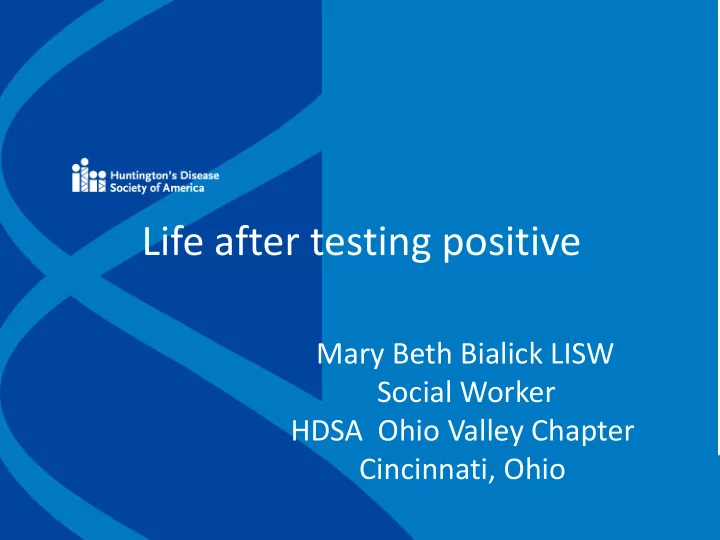

Life after testing positive Mary Beth Bialick LISW Social Worker HDSA Ohio Valley Chapter Cincinnati, Ohio
The information provided by speakers in workshops, forums, sharing/networking sessions and any other educational presentation made as part of the 2017. HDSA Convention program is for informational use only. HDSA encourages all attendees to consult with their primary care provider, neurologist or other healthcare provider about any advice, exercise, medication, treatment, nutritional supplement or regimen that may have been mentioned as part of any presentation.
Presenter Disclosures Mary Beth Bialick The following personal financial relationships with commercial interests relevant to this presentation existed during the past 12 months: No relationships to disclose or list
Talking and sharing about living with a positive HD gene test result. • Review of HD testing process and results delivery • Discuss good news/bad news and reactions • Potential behaviors and responses • Ways to cope and live positively • Audience sharing
Deciding to test • Very personal decision • Opinions vary greatly even within the same family • Why test? Why now? • Always an individual decision with no coercion from others
HD testing process • Team : genetic counselor, neurologist, social worker, psychologist • Initial visit Review of family history Discussion about implications of testing Neurology exam Social work assessment
Results visit Delivery of results • All results carry stress good and bad • Support person beneficial at all visits • Plan sufficient time for day of results
Possible Test Results Number of CAG Repeats Expected Features 26 or less Negative – not at risk of HD or gene expansion 27 - 35 Negative – not at risk of HD; however gene expansion may occur in future generations 36 - 39 Uncertain – disease causing but reduced penetrance (may have later age of onset, may not show symptoms) 40 or more Positive – full penetrance (symptoms of HD will occur at some time) 55 – 60 or more Positive – juvenile HD (symptoms occurring before the age of 20 – accounts for 5-10% of all HD)
https://xkcd.com/830/
All results carry stress. Good or bad results are stressful • After results appointment it often takes days to process the information. • Sharing results is very stressful. • Potential reactions to positive test results • Possible behaviors following test results
Potential Reactions to Positive test results • Denial/disbelief/dismissal • Shock • Fear • Loss • Anxiety • Sadness • Despair
Potential Reactions to Positive test results • Anger – toward the situation, self, doctor, family. • Powerlessness/loss of control • Guilt • Shame • Grief • Depression • Remorse – regret testing • Relief – end of uncertainty
Relief of getting a result • Pro’s and Con’s were surprisingly similar • Preparing for the future • Informing children and family • Family planning • Sense of relief with the known status • Remove uncertainty / removes hope
Possible behaviors following test results • Sleep disturbances • Appetite disturbances • Absent-mindedness/forgetfulness • Social withdrawal • Hyper awareness of body and physical symptoms • Restless over-activity • Crying • Self medicating
Positive results with no symptoms • Feelings may be intense • Self identity is questioned • Concern about developing symptoms • Anxiety about how you are perceived by others
Factors that may affect coping • Personality / ego • Support network • Reasons for testing • Expectations of test results • General health • Age • Communication style • Spiritual belief system
Where to get support • Spouse / Significant other • Family • Close friends • Professional help • HD community • Find what brings joy and pursue it
Signs of moving forward • Return to day to day activities • Emotional stability • Joy and enthusiasm for life • Involvement in established relationships • How you live daily with HD
Advice from those who have tested positive • It takes TIME to adjust to the result • Normal to be angry, sad, depressed, etc • Talking to someone who understands HD or has gone through the process can help • Just because you test positive for the gene does not mean you automatically have symptoms • Most people eventually do adapt to living gene positive and enjoying their life
Thank you all Thanks to the genetics team at the University of Cincinnati • Dr. Andrew Duker • Kathleen Collins, LGC • Christine Spaeth LGC
Resources • Huntington Disease Society of America (HDSA) – www.HDSA.org • National Society of Genetic Counselors – www.nsgc.org • Huntington’s Disease Lighthouse Families – www.hdlf.org • Huntington’s Disease Youth Organization – en.hdyo.org • HDBuzz - https://en.hdbuzz.net/
Recommend
More recommend